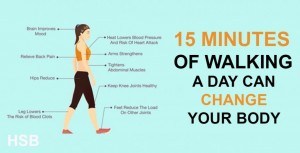Walking Back to Happiness
 Walking is a simple, gentle form of exercise that requires no special training or equipment and is accessible to almost everyone. Yet, the importance of walking as an extremely effective physical activity is often overshadowed by more vigorous forms of exercise, such as running.
Walking is a simple, gentle form of exercise that requires no special training or equipment and is accessible to almost everyone. Yet, the importance of walking as an extremely effective physical activity is often overshadowed by more vigorous forms of exercise, such as running.
Weight-bearing Exercise
Walking is a weight-bearing, but lower impact exercise, which works your muscles and bones against gravity, but subjects the body to less than half the ground reaction forces experienced while running. Consequently, walking may be a more appropriate exercise for anyone who is overweight, or suffers from ankle, knee or back problems. Furthermore, regular, weight-bearing exercise not only strengthens bones and improves balance, but helps to build and maintain muscle mass. Increased muscle strength and endurance, in turn, boosts your metabolism, so you burn more calories, making it easier to reduce your body fat and maintain a healthy weight.
Weight Control & Cardiovascular Fitness
 Maintaining a healthy weight is important for anyone with high levels of low density lipoprotein (LDL) cholesterol. LDL cholesterol is known, as ‘bad’ cholesterol because it makes up the of ‘plaque’, which builds up in your arteries, causing a condition called ‘arteriosclerosis’. High density lipoprotein (HDL) cholesterol, on the other hand, is known as ‘good’ cholesterol because it carries cholesterol back to the liver, where it is removed from the body. Walking lowers the level of LDL cholesterol in your body and raises the level of HDL cholesterol, so creates a ‘win-win’ situation for your health and well-being. Of course, walking is not the most physically demanding form of cardiovascular exercise, but can still increase the capability of your heart, lungs, and circulatory system to deliver oxygen to your muscle tissues. Improved cardiovascular fitness lowers your risk of heart disease, stroke, high blood pressure, a.k.a. ‘hypertension’, and diabetes. One study suggested that women who walked for up to 30 minutes a day, at a moderate pace, could reduce their risk of heart disease by up to 40%, while another suggested that women who walked for 60 minutes a day, at a brisk pace, could reduce their risk of type 2 diabetes by 50%.
Maintaining a healthy weight is important for anyone with high levels of low density lipoprotein (LDL) cholesterol. LDL cholesterol is known, as ‘bad’ cholesterol because it makes up the of ‘plaque’, which builds up in your arteries, causing a condition called ‘arteriosclerosis’. High density lipoprotein (HDL) cholesterol, on the other hand, is known as ‘good’ cholesterol because it carries cholesterol back to the liver, where it is removed from the body. Walking lowers the level of LDL cholesterol in your body and raises the level of HDL cholesterol, so creates a ‘win-win’ situation for your health and well-being. Of course, walking is not the most physically demanding form of cardiovascular exercise, but can still increase the capability of your heart, lungs, and circulatory system to deliver oxygen to your muscle tissues. Improved cardiovascular fitness lowers your risk of heart disease, stroke, high blood pressure, a.k.a. ‘hypertension’, and diabetes. One study suggested that women who walked for up to 30 minutes a day, at a moderate pace, could reduce their risk of heart disease by up to 40%, while another suggested that women who walked for 60 minutes a day, at a brisk pace, could reduce their risk of type 2 diabetes by 50%.
Mood & Other Benefits
 Scientific studies also suggest that walking, especially walking outdoors, even for periods as short as 12-15 minutes, can have a profound effect on your mood. According to one study of clinically depressed subjects, published in the Archives of Internal Medicine, between 60% and 70% of those who walked on a daily basis, not only responded at least as well as subjects taking medication, but so well that they could no longer be deemed ‘depressed’ in the clinical sense. Regular walking has an overwhelmingly positive effect on health, but also has other, less tangible, benefits. You can, of course, walk alone, but walking with other people may allow you to develop new friendships and create a ‘group dynamic’, which motivates everyone to walk regularly. Either way, you can walk as briskly or as slowly as you like, for as long or a short as you like, and experience the physiological and psychological benefits of being outdoors, including higher energy, higher creativity, lower stress and, of course, you daily dose of vitamin D from exposure to sunlight.
Scientific studies also suggest that walking, especially walking outdoors, even for periods as short as 12-15 minutes, can have a profound effect on your mood. According to one study of clinically depressed subjects, published in the Archives of Internal Medicine, between 60% and 70% of those who walked on a daily basis, not only responded at least as well as subjects taking medication, but so well that they could no longer be deemed ‘depressed’ in the clinical sense. Regular walking has an overwhelmingly positive effect on health, but also has other, less tangible, benefits. You can, of course, walk alone, but walking with other people may allow you to develop new friendships and create a ‘group dynamic’, which motivates everyone to walk regularly. Either way, you can walk as briskly or as slowly as you like, for as long or a short as you like, and experience the physiological and psychological benefits of being outdoors, including higher energy, higher creativity, lower stress and, of course, you daily dose of vitamin D from exposure to sunlight.
If you find walking difficult visit our caring and experienced team at Chatfield Chiropractic in Roxburgh Park or Sunbury for a checkup.
